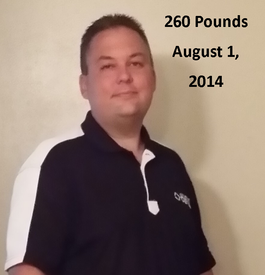We are pleased to announce that as of March 4, 2025, an updated Rich Text Editor has been introduced in the MyFitnessPal Community. To learn more about the changes, please click here. We look forward to sharing this new feature with you!
Net Amount of Calories

Mhellwig76
Posts: 3 Member
After I exercise, I notice I have more calories added. Does this mean I have to eat that many calories for the day or should I stick with the original amount I am to eat on a daily basis?
(i.e. I am allowed 1260 calories/day but if I burn 350 exercising, the net amount says 1610 Net). Does this mean I should be eating 1610 calories or 1260?
(i.e. I am allowed 1260 calories/day but if I burn 350 exercising, the net amount says 1610 Net). Does this mean I should be eating 1610 calories or 1260?
0
Replies
-
just search for "eating exercise calories" in the forums, you'll find days and days worth of reading on the topic0
-
1610; you should eat your exercise calories. I didn't believe it at first, but it seems to be true!0
-
Yea I've noticed that as well. Some say you should eat your exercise calories, however I've also seen some say to eat some of them. Will be interested to know the correct answer as well.0
-
I don't eat them all but I do try to dip into them seems to be working0
-
Short answer, you're allowed.
 0
0 -
After I exercise, I notice I have more calories added. Does this mean I have to eat that many calories for the day or should I stick with the original amount I am to eat on a daily basis?
(i.e. I am allowed 1260 calories/day but if I burn 350 exercising, the net amount says 1610 Net). Does this mean I should be eating 1610 calories or 1260?
u will get lots of different opinions. i have always gone with making sure i net 1200...0 -
I don't know the definitive answer but I can tell you it has been my experience (over the last 2 months) that I seem to better just eating my daily calories as they are set. I am allowed 1,920 calories per day but I rarely go over 1,800 and most days I am between 1,200 - 1,500 calories. I tend to have better weight loss when I stay under and disregard "net-calories."0
-
After I exercise, I notice I have more calories added. Does this mean I have to eat that many calories for the day or should I stick with the original amount I am to eat on a daily basis?
(i.e. I am allowed 1260 calories/day but if I burn 350 exercising, the net amount says 1610 Net). Does this mean I should be eating 1610 calories or 1260?
1610...Your calorie deficit to lose X amount of lbs per week is already built in by MFP when they set your daily goal at 1260. So, if you burn more, you eat more! Simple as that!0 -
Some do, some don't. Experiment and do what works best for you!
I eat them if I'm hungry or if I want a treat but not necessarily all of them.0 -
Everyone has different opinions about it and I don't think you'll find a 100% definitive answer anywhere, but after you wade through the responses and reading if you do decide to eat back the exercise calories I'd suggest (completely my opinion though) not eating 100% of them back just because we really never now the *exact* amount of calories we burn. I'd rather eat a handful fewer than a handful more. Personally, right now, I'm not eating mine back, but I'm still very overweight and I haven't had any "weight loss slow downs" that the bulk of the pro-exercise calorie eaters say will happen. When I get smaller I'll test different strategies and go with what works then.0
-
http://www.myfitnesspal.com/topics/show/10589-for-those-confused-or-questioning-eating-your-exercise-calo
^ read that link there.
This is a hotly debated topic on the forums. The answer is (as with all weight loss) that there is NO one fill all answer. If you are losing not eating your exercise calories don't eat them, if you plateau try eating them (for a month) if you don't start losing or gain after the month try eating only half (again for a month).
The bottom line is you have to find what works for you.0 -
there are a lot of opinions about this topic, so I won't offer another one, what i WILL do is offer you the science behind why we say to eat them (generally) and when it's "ok" not to eat them, and why some people do better not eating them.
this is a difficult thing to pin down as there are a lot of moving parts, so you have to read my whole explanation before you make a comment please. Please note, the post above with the link to "for those of you...", that's my post (under a different username, don't ask, long story).
I'm a science geek, went to college for chemistry, and when I started researching nutrition and exercise, well, I just couldn't stop. Eventually I received a certification in Personal Training, but went WELL beyond that with the nutrition side of it. I understand the ins and outs of human chemistry (as well as anyone who isn't a trained expert can be I suppose, and maybe better than some "experts" out there).
Anyway, here's the deal.
To understand exercise calories you must first understand homeostasis, I.E. maintenance calories. The human body has an amount of calories that keeps it in "balance". Each person has a different number based on their genetics, age, healthy, weight, height, sex, activity level, type of nutrients they eat...etc. Chemically speaking, the body uses hormones to control what it does with incoming macronutrients. If muscles require protein, they'll send out signals to your glands to produce more of one kind of hormone to stimulate the body to release more protein. If your body is low on energy, it'll release other hormones that tell your liver and/fat cells to release glucose and FFA's (Free Fatty Acids) to help supply you with more energy. If you have plenty of energy, then the body will release other hormones that force your body to store the extra energy as fat.
it's ABSOLUTELY VITAL to know that no matter what goes on your body will always try to achieve homeostasis. There's no caveat here, there's not exceptions to this rule, this is the simple fact.
When we are in a calorie deficit, the difference between what your body perceives as maintenance, and what you're taking in, is the deficit. If your deficit is within a certain range, the body can make up the difference with fat stores and to a lesser degree, stored glycogen (glycogen is just a form of glucose, which is the body's primary energy source and is derived from carbohydrates).
In the short term (a few days), the body can cope with very low incoming energy levels by releasing the maximum amount of stored energy available. But after glycogen reserves are depleted, the body starts recognizing that it can no longer keep up with the demand, as such, it begins to lower some of the "less important" body functions in order to reach maintenance. That means it will start canabalizing unused or rarely used muscle (because muscle is an active tissue and requires energy, whether it's in use or not), slowing down certain systemic functions like the immune system and circulatory system, and some of the secondary organs. This is BAD!!!
NOW
How does one determine if they have too few calories coming in? Generally you can tell because of how your weight loss is going, and to a lesser extent, by how you feel and look (unless you're very in tune with your body). If you're concerned and don't know, ask an expert, or someone who's been doing it a while that you trust (as a starting point). The idea is to do this in a slow controlled manner.
What you need to keep in mind:
1) The more fat you have to lose, the larger your deficit can be. Since your body can only use stored fat that it can get to, fat needs to be available to the blood stream to be released. The more surface area of fat you have, the more of it can be released into the blood stream. I.E. someone with 50 lbs of extra fat can normally have a larger deficit than a person of the same general statistics but with only say 30 lbs of extra fat.
2) People who are morbidly obese usually don't need to start out eating all of their exercise calories. But this is a fine line to walk, you'll lose weight faster at the start, but you must be cognizant of the fact that as you lose the fat, you must lower your deficit to compensate.
3) With regards to your deficit, the TYPE of calories you are eating is not highly important, but as your deficit diminishes, nutrient types become more vital as your body becomes more of a fat burning machine. So while you can start very general, you must finish very specific.
Hope this helps guys,
feel free to PM me if you have any questions.
-Banks0
This discussion has been closed.
Categories
- All Categories
- 1.4M Health, Wellness and Goals
- 391.6K Introduce Yourself
- 44K Getting Started
- 259.7K Health and Weight Loss
- 175.6K Food and Nutrition
- 47.5K Recipes
- 232.3K Fitness and Exercise
- 444 Sleep, Mindfulness and Overall Wellness
- 6.4K Goal: Maintaining Weight
- 8.6K Goal: Gaining Weight and Body Building
- 153.1K Motivation and Support
- 7.8K Challenges
- 1.3K Debate Club
- 96.4K Chit-Chat
- 2.5K Fun and Games
- 3.3K MyFitnessPal Information
- 23 News and Announcements
- 1.2K Feature Suggestions and Ideas
- 2.3K MyFitnessPal Tech Support Questions










